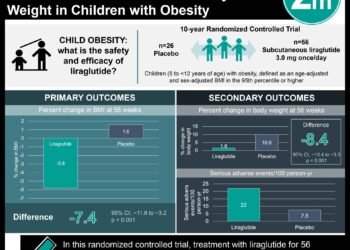Plastic bags reduce hypothermia among premature newborns
Image: PD
1. Plastic bags made from polyethylene reduced hypothermia among premature and low birth weight newborns by 26%.
2. The use of plastic bags for hypothermia prevention was not associated with hyperthermia or skin side effects.
Evidence Rating Level: 1 (Excellent)
Study Rundown: Neonatal hypothermia has been associated with serious adverse outcomes, such as increased risk of infection, coagulation defects, acidosis, brain hemorrhage, and increased mortality. While evaporative heat loss is the main cause of hypothermia in newborns within 30 minutes after birth, plastic bags made from polyethylene could prevent this form of heat loss. Results from this study indicated that premature and low birth weight newborns had a 26% decreased risk of hypothermia when placed in a plastic bag covering their trunks and extremities compared to control infants. Furthermore, this technique did not produce hyperthermia or any skin side effects. Study limitations included short intervention duration, inaccuracy of pregnancy dating, and lack of environmental temperature control in the delivery rooms. Nonetheless, these findings suggest that plastic bags could serve as a low-cost solution to hypothermia in premature and low birth weight newborns.
Click to read the study published today in Pediatrics
Relevant Reading: Body temperature and survival of premature infants
Study Author, Wally Carlo, MD, talks to 2 Minute Medicine: Edwin M. Dixon Professor of Pediatrics; Director, Divison of Neonatology; Director, Newborn Nurseries; University of Alabama at Birmingham.
“Physicians should know that the American Academy of Pediatrics, through its Neonatal Resuscitation Program, recommends the use of plastic bags at birth for very preterm infants. This is a practice that should be implemented. This trial documents that this intervention is also effective in reducing hypothermia in moderate and late preterm infants, who are also at higher risk of hypothermia compared to term infants. Further research is needed to determine if plastic bags reduce other adverse outcomes.”
In-Depth [randomized, controlled trial]: A total of 104 premature or low birth weight infants from Lusaka, Zambia were randomized to either the intervention group, in which the infant was placed in a plastic bag covering the trunk and extremities for at least 1 hour after birth until axillary temperature normalized, or to a control group, in which the infant was set on the mother’s abdomen, dried with blankets, and stimulated with radiant warmers if necessary. More than 80% of all the infants had hypothermia at 10 minutes after birth. Those placed in plastic bags were significantly more likely to have a normalized temperature at 1 hour after birth compared to control (59% vs. 33%; 95% CI: 1.16-2.81, p = .007). Furthermore, plastic bags reduced the risk of hypothermia by 26% (NNT = 4). Although infants in the intervention group had a significantlygreater mean temperature at 1 hour than control infants (36.5 ± 0.5ºC vs. 36.1 ± 0.6ºC; p < .001), none of the infants developed hyperthermia and the plastic bags were not associated with any skin side effects.
By Cordelia Y. Ross and Leah H. Carr
More from this author: Untreated breast milk linked to CMV transmission; Early, limited formula supplementation associated with prolonged breastfeeding; Few clinical drug trials exist for pediatric neuropsychiatric conditions; Many children with cancer exposed to home medication errors; Parents feeding control practices related to child’s weight and gender; Social networks play key roles in parental vaccination decisions; Shorter sleep duration associated with increased adolescent BMI; Varicella vaccine provides 14-year protection against childhood chicken pox
© 2013 2minutemedicine.com. All rights reserved. No works may be reproduced without written consent from 2minutemedicine.com. Disclaimer: We present factual information directly from peer reviewed medical journals. No post should be construed as medical advice and is not intended as such by the authors or by 2minutemedicine.com. PLEASE SEE A HEALTHCARE PROVIDER IN YOUR AREA IF YOU SEEK MEDICAL ADVICE OF ANY SORT. Content is produced in accordance with fair use copyrights solely and strictly for the purpose of teaching, news and criticism. No benefit, monetary or otherwise, is realized by any participants or the owner of this domain.






